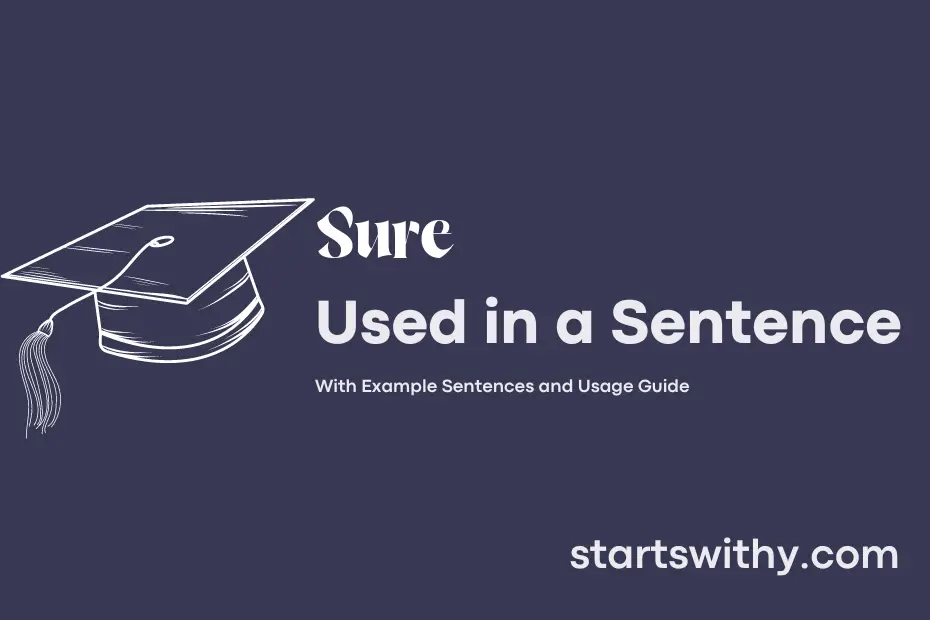Do you ever find yourself nodding along in agreement but secretly unsure of what is being discussed? The word “sure” serves as an affirming response indicating agreement or certainty in English language.
When used in a sentence, “sure” typically conveys a sense of confidence or willingness. Whether used to express doubt or reassurance, this versatile word encapsulates a wide range of emotions and intentions.
7 Examples Of Sure Used In a Sentence For Kids
- Sure, you can have some crayons to color with.
- Do you want to play outside? Sure thing!
- Are you ready for story time? Sure you are!
- Sure you can have a sticker for doing a good job.
- Would you like to sing a song? Sure you can!
- Are you excited for snack time? Sure you are!
- Would you like to build a tower with blocks? Sure you can!
14 Sentences with Sure Examples
- Sure, I can help you with the assignment after I finish my own work.
- Are you coming to the library to study? Sure, I’ll meet you there in an hour.
- Sure, I can lend you my notes for the upcoming exam.
- Can you remind me about the deadline for the project? Sure, I’ll put a reminder on my phone.
- Sure, let’s grab a quick bite before heading to the lecture.
- Are you going to the college fest this weekend? Sure, I wouldn’t miss it for anything.
- Can you proofread my essay before I submit it? Sure, I’ll take a look at it later today.
- Sure, I can give you a ride to the campus if you need one.
- Do you want to join the study group for the upcoming test? Sure, I could use the extra help.
- Sure, I can reserve a table at the canteen for us during the lunch break.
- Can you help me understand this topic? Sure, let’s go through it together after class.
- Sure, I can share my textbook with you for the semester.
- Do you want to join the sports club with me? Sure, I’ve been looking for a way to stay active.
- Sure, I will remind you about the presentation tomorrow morning.
How To Use Sure in Sentences?
Sure can be used to express agreement or confirmation in a sentence. For example, “Sure, I can help you with your homework” shows willingness to assist.
Another way to use Sure is to indicate certainty or assurance. For instance, “I am sure we can find a solution to the problem” conveys confidence in finding a resolution.
Moreover, Sure can also be used to grant permission or give consent. An example would be, “Sure, you can borrow my book for the weekend” demonstrating approval for the action.
Furthermore, Sure can be used as a polite way to respond to a request or offer. When someone asks, “Can you pass me the salt?” replying with “Sure” affirms the willingness to fulfil the request.
In conversations, Sure can also be used to express enthusiasm or readiness. Saying “Sure, I would love to go to the movies with you” demonstrates eagerness and excitement.
Remember, the tone and context of the sentence will influence the meaning of the word Sure. It is essential to pay attention to the tone of voice and overall conversation to correctly interpret the intended message. Practice using Sure in various scenarios to become more comfortable incorporating it into your everyday speech.
Conclusion
In conclusion, using sentences with the word “sure” can convey confidence, assurance, or agreement in a conversation. When someone says “sure,” they are typically expressing their consent or willingness to comply with a request or suggestion. It is a simple yet powerful word that can help in clearly indicating affirmation or certainty in communication.
By incorporating sentences with “sure” into conversations, individuals can convey their support, agreement, or commitment effectively. Whether used to confirm plans, express agreement, or indicate readiness to assist, the word “sure” adds a level of certainty and positivity to dialogues. It serves as a versatile tool for clear and concise communication, making interactions smoother and more straightforward.



